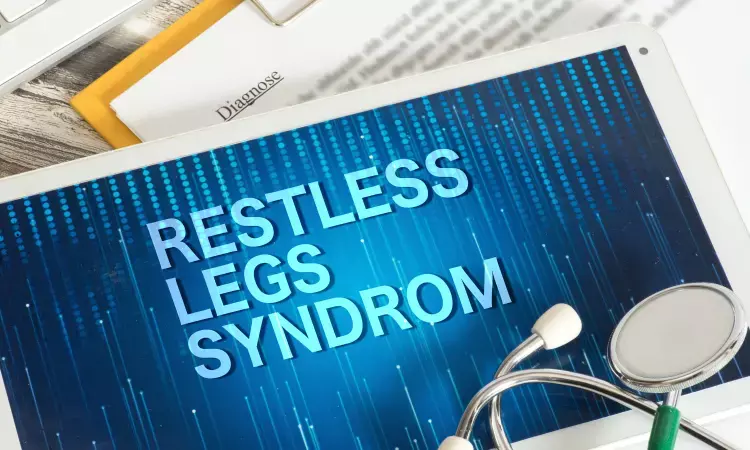- Home
- Medical news & Guidelines
- Anesthesiology
- Cardiology and CTVS
- Critical Care
- Dentistry
- Dermatology
- Diabetes and Endocrinology
- ENT
- Gastroenterology
- Medicine
- Nephrology
- Neurology
- Obstretics-Gynaecology
- Oncology
- Ophthalmology
- Orthopaedics
- Pediatrics-Neonatology
- Psychiatry
- Pulmonology
- Radiology
- Surgery
- Urology
- Laboratory Medicine
- Diet
- Nursing
- Paramedical
- Physiotherapy
- Health news
- Fact Check
- Bone Health Fact Check
- Brain Health Fact Check
- Cancer Related Fact Check
- Child Care Fact Check
- Dental and oral health fact check
- Diabetes and metabolic health fact check
- Diet and Nutrition Fact Check
- Eye and ENT Care Fact Check
- Fitness fact check
- Gut health fact check
- Heart health fact check
- Kidney health fact check
- Medical education fact check
- Men's health fact check
- Respiratory fact check
- Skin and hair care fact check
- Vaccine and Immunization fact check
- Women's health fact check
- AYUSH
- State News
- Andaman and Nicobar Islands
- Andhra Pradesh
- Arunachal Pradesh
- Assam
- Bihar
- Chandigarh
- Chattisgarh
- Dadra and Nagar Haveli
- Daman and Diu
- Delhi
- Goa
- Gujarat
- Haryana
- Himachal Pradesh
- Jammu & Kashmir
- Jharkhand
- Karnataka
- Kerala
- Ladakh
- Lakshadweep
- Madhya Pradesh
- Maharashtra
- Manipur
- Meghalaya
- Mizoram
- Nagaland
- Odisha
- Puducherry
- Punjab
- Rajasthan
- Sikkim
- Tamil Nadu
- Telangana
- Tripura
- Uttar Pradesh
- Uttrakhand
- West Bengal
- Medical Education
- Industry
Aerobic and stretching exercises improve symptoms and QoL in patients with primary Restless Legs Syndrome

Restless legs syndrome (RLS), commonly known as Willis-Ekbom disease, primary RLS, and idiopathic RLS, is a neurological disorder that causes unpleasant or uncomfortable sensations in the legs and an irresistible urge to move them.
So far there is no cure for RLS but some symptoms are treated. Exercise is said to provide temporary relief. Sometimes RLS symptoms can be controlled by treating an associated medical condition, such as peripheral neuropathy, diabetes, or iron deficiency anemia.
A recent study in Movement Disorders journal aimed to examine the effects of aerobic exercise and stretching exercise programs on symptom severity, sleep, and quality of life in patients with primary RLS and found that both the exercise improved the symptoms, approaches have proven to be highly effective in patients with RLS. However exercise might differ from patient to patient and must be properly planned with clinical manifestations and the number of exercise as well.
Researchers selected 18 patients between the ages of 22 and 61 and randomly divided into 3 groups as aerobic exercise, stretching exercises, and control. All exercise programs were applied 3 times a week for 8 weeks. Evaluations were performed before and after treatment. Symptom severity of the patients was evaluated by the International Restless Legs Syndrome Study Group Rating Scale, sleep was evaluated with the Pittsburgh Sleep Quality Index and actigraphy, and quality of life was evaluated with the John Hopkins Restless Legs Syndrome Quality of Life Questionnaire. Recovery status of the patients was determined using the post treatment global change scale.
The key findings of the study are
• Aerobic exercise and the stretching exercise program were found to be effective in decreasing RLS symptoms (P = 0.025, P = 0.034) and improving subjective sleep quality (P = 0.034, P = 0.025), overall sleep quality (P < 0.001, P = 0.034), and quality of life (P = 0.009, P = 0016).
• Aerobic exercises were found to be more effective in reducing wake after sleep onset of sleep (P = 0.048), whereas stretching exercises reduced sleep disorders (P = 0.025).
Researchers concluded that “Both exercise approaches have been identified as highly effective approaches in patients with RLS. The treatment can be planned according to the choice of the available facilities, patient and clinician preference, and the advantages of the 2 exercise approaches.”
Reference: Özge Çoban PT, PhD Necmiye Ün Yıldırım PT, PhD, Mustafa Ertuğrul Yaşa PT, PhD Ali Rıza Sonkaya MD; Effects of Different Exercise Programs on Symptoms, Sleep, and Quality of Life in Patients with Primary Restless Legs Syndrome, 04 July 2023, Movement disorders, DOI: https://doi.org/10.1002/mdc3.13833.
MSc. Neuroscience
Niveditha Subramani a MSc. Neuroscience (Faculty of Medicine) graduate from University of Madras, Chennai. Ambitious in Neuro research having worked in motor diseases and neuron apoptosis is interested in more of new upcoming research and their advancement in field of medicine. She has an engrossed skill towards writing and her roles at Medical dialogue include Sr. Content writer. Her news covers new discoveries and updates in field of medicine. She can be reached at editorial@medicaldialogues.in
Dr Kamal Kant Kohli-MBBS, DTCD- a chest specialist with more than 30 years of practice and a flair for writing clinical articles, Dr Kamal Kant Kohli joined Medical Dialogues as a Chief Editor of Medical News. Besides writing articles, as an editor, he proofreads and verifies all the medical content published on Medical Dialogues including those coming from journals, studies,medical conferences,guidelines etc. Email: drkohli@medicaldialogues.in. Contact no. 011-43720751


